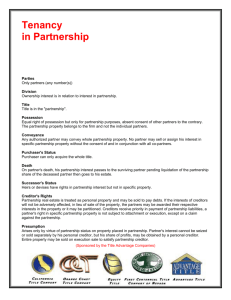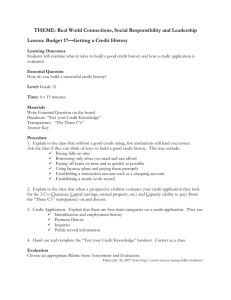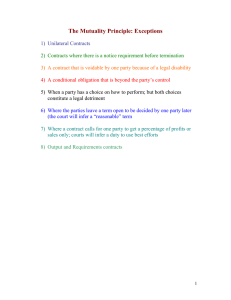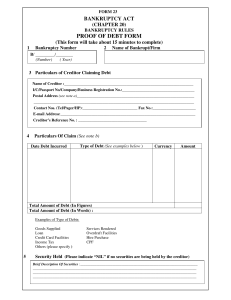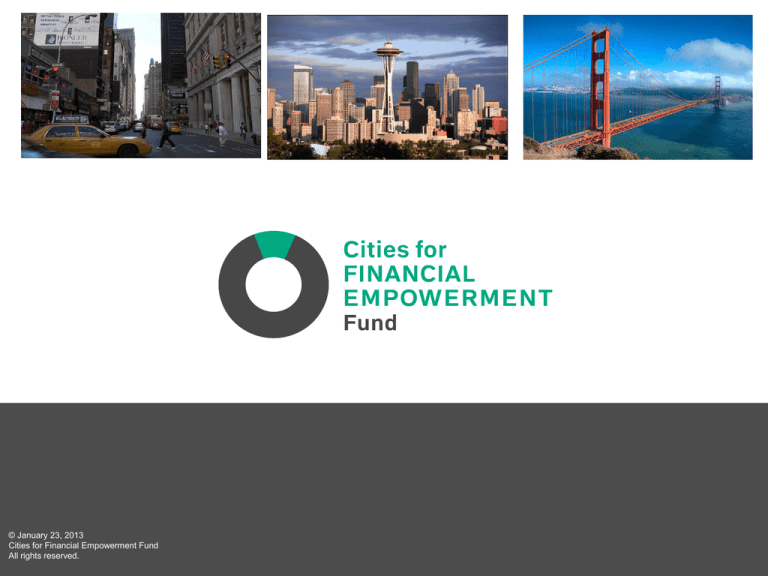
© January 23, 2013
Cities for Financial Empowerment Fund
All rights reserved.
Financial Empowerment Center Counselor
Training Curriculum
Topic 5: Consumer Protection and Debt CollectionThe Regulatory and Legal Environment
www.cfefund.org
AGENDA
I.
II.
III.
IV.
V.
VI.
VII.
VIII.
Overview of Regulatory Environment
Overview of Debt Collection Process
Original Creditors
A. Laws Governing Collection Practices
B. Suggested Debtor Action Steps
Third Party Collectors
A. Buyers of Debt or Agents (Including Attorney Pre-litigation)
B. Laws Governing Third Party Collector Practices
C. Suggested Debtor Action Steps
Litigation
Post-Litigation
Suggested Debtor Action Steps
Fair Credit Reporting Act
© January 23, 2013
Cities for Financial Empowerment Fund
All rights reserved.
www.cfefund.org I 3
Learning Objectives
• Understand the differences among original creditor, third
party collector and buyers of debt.
• Understand what debtor should do with different types of
creditors.
• Understand how federal, state and city laws interface.
• Understand the pre-litigation, litigation and post litigation
process.
© January 23, 2013
Cities for Financial Empowerment Fund
All rights reserved.
www.cfefund.org I 4
Overview of Regulatory Environment
•
Consumer protection laws exist on federal, state and
local levels.
•
Enforcement may take place through several
different agencies at each of the federal, state and
local levels, e.g. Federal Trade Commission and the
Consumer Financial Protection Board may both have
jurisdiction over same institution or activity.
© January 23, 2013
Cities for Financial Empowerment Fund
All rights reserved.
www.cfefund.org I 5
Overview of Debt Collection Process
Generally follows this path, but not always
Debt is over due
De
to original
creditor
< 30 days Pay debt
plus late charges
&interest
Debt between 30
days to 120 days
over due to
original creditor
Reported to credit
bureaus – stays in
report 7 years –may
receive calls or
letters from original
creditor
Or
Original creditor retains
debt and continues debt
collection process by
writing, calling, etc.
Creditor charges off debt
after 180 days
Original Creditor
Third Party Collector
Debtor back on track
Debtor is back on
track
Pay debt plus late
charges & interest or
work out settlement
– credit score
impacted
Or
Original creditor retains debt
and hires debt collection
agent (agent or attorney
hired to collect pre-litigation
is third party collector).
Creditor charges off debt
after 180 days
Or
Original creditor
sells debt (buyer of
debt is third party
collector) usually
after it charges off
the debt after 180
days
Hires attorney to
start litigation
(can happen at
any time) ending
in settlement or
judgment
6
Original Creditor Relationship
• Contractual relationship – governs creditor/debtor rights.
• Direct privity of contract gives the parties rights and obligations
between them.
• Original creditor (assignor) can transfer (assign) its/his interest to a
third party (assignee).
Buyer may be treated as the original creditor, e.g. Company X
buys Company Y and now owns the account.
Buyer of defaulted debt becomes a third party collector for
purposes of collections laws.
Buyer is subject to the obligations and any defenses available
against original creditor, e.g. Statute of Limitations.
© January 23, 2013
Cities for Financial Empowerment Fund
All rights reserved.
www.cfefund.org I 7
Original Creditor
Federal Laws Governing Collection Practices
A.
Credit card debt
1. Federal Fair Credit Billing Act (FCBA) Applies to “open
end” accounts, i.e. credit cards and revolving charge accounts
(not installment loans).
a. Consumers have right to contest bill: notify “billing
inquiries” within 60 days after receipt of incorrect
invoice.
i. Include copies of documentation with letter
b. Creditor must respond within 30 days after receiving
dispute (i.e. acknowledge receipt).
© January 23, 2013
Cities for Financial Empowerment Fund
All rights reserved.
www.cfefund.org I 8
Original Creditor
Fair Credit Billing Act (credit cards & revolving loans) cont’d
c. Creditor must resolve within two billing cycles and notify
consumer (within 90 days of receiving consumer’s letter) – the
investigation period.
i. Consumer may withhold payment on the disputed
amount (and related charges) and pay any part of the bill
not in question.
ii. creditor may not take legal or other action to collect the
disputed amount and related charges (including finance
charges).
iii. account can't be closed or restricted, the disputed
amount can be applied against credit limit.
© January 23, 2013
Cities for Financial Empowerment Fund
All rights reserved.
www.cfefund.org I 9
Original Creditor
Fair Credit Billing Act (credit cards & revolving loans) cont’d
iv. creditor may not threaten credit rating, report
delinquency, accelerate debt, or restrict or close but may
report that consumer is challenging.
v. If bill has error creditor must explain — in writing — the
corrections to be made to account, crediting account,
remove all finance charges, late fees, or other charges
related to the error.
© January 23, 2013
Cities for Financial Empowerment Fund
All rights reserved.
www.cfefund.org I 10
Original Creditor
Fair Credit Billing Act cont’d
vi. If creditor determines portion of the disputed amount is
owed– must send consumer written explanation. Consumer
may request copies of documents proving debt is owed.
vii. If creditor determines bill is correct, must notify consumer
promptly—in writing—amount owed and why. Consumer may
ask for copies of relevant documents. At this point, consumer
will owe the disputed amount, plus any finance charges while
the amount was in dispute. Consumer may have to pay the
minimum amount that was missed because of dispute.
© January 23, 2013
Cities for Financial Empowerment Fund
All rights reserved.
www.cfefund.org I 11
Original Creditor
Fair Credit Billing Act cont’d
viii. If consumer disagrees with results of investigation, must
write to the creditor within 10 days after receiving
explanation. Consumer may indicate refusal to pay disputed
amount.
Creditor may begin collection procedures.
If creditor reports to credit reporting company as
delinquent, must also state consumer is disputing.
Creditor must inform consumer who gets these
reports. If issue resolved creditor must promptly
report, to everyone who got a report.
© January 23, 2013
Cities for Financial Empowerment Fund
All rights reserved.
www.cfefund.org I 12
Original Creditor
Fair Credit Billing Act cont’d
ix . Any creditor failing to follow settlement procedure may not collect
disputed amount or any related finance charges, up to $50, even if the
bill turns out to be correct. For example, if a creditor acknowledges your
complaint in 45 days — 15 days too late — or takes more than two billing
cycles to resolve a dispute, the penalty applies. The penalty also applies
if a creditor threatens to report — or improperly reports — your failure
to pay during the dispute period.
d. Consumers’ rights where creditor violates FCBA-damages, 2x
finance charges ($100 to $1k), attorneys fee at court’s discretion.
e. Liability limited to $50 in case of unauthorized use.
© January 23, 2013
Cities for Financial Empowerment Fund
All rights reserved.
www.cfefund.org I 13
Original Creditor
B. Other Federal Laws Governing Original Creditors
1. Truth-in-Lending Act (TILA) requires lenders to provide
certain information so consumers can compare terms of
various loans.
a. Information to be disclosed is detailed and highly
regulated.
b. Regulates how a lender can advertise consumer credit.
c. Does not directly govern collection practices, but
violation may be defense in a collection action.
d. Fair Credit Billing Act is part of TILA.
2. Fair Credit Reporting Act requires providers of information
to reporting agencies to be accurate.
© January 23, 2013
Cities for Financial Empowerment Fund
All rights reserved.
www.cfefund.org I 14
Original Creditor
Suggested Actions for Debtor
1. Do not ignore debt collection call or letter.
2. If debt is incorrect or not yours, dispute immediately—best
in writing (w/in 60 days if credit card or revolving credit –
FCBA).
3. If debt is owed:
a. establish how much is owed – ask for break down of
principal, interest , late payment charges and other fees
and when the default occurred.
i. Make a record of call, time, date, and name of
caller by taking notes or recording the call.
© January 23, 2013
Cities for Financial Empowerment Fund
All rights reserved.
www.cfefund.org I 15
Original Creditor
Suggested Actions for Debtor
b. Negotiate with creditors to make payments manageable
(waive late fees, payment plan).
c. Do not reveal financial information except for inability to pay
– collector may be fishing for assets or payment ability.
d. Prioritize debts, pay more on high rate debt first.
e. Know and assert rights during negotiation as leverage.
f. Consider use of “cease and desist” carefully – ask instead that
all contact be in writing– a complete cease and desist may
result in debtor not knowing what steps taken by creditors.
© January 23, 2013
Cities for Financial Empowerment Fund
All rights reserved.
www.cfefund.org I 16
Original Creditor
Suggested Actions for Debtor
4. If statute of limitations has passed ( time in which creditor
must bring a lawsuit on debt).
a. Check to see what the statutes of limitations are for:
i. Written Contracts
ii. Oral Contracts
iii. Promissory Notes
iv. Open Accounts (credit card or other revolving
loans)
© January 23, 2013
Cities for Financial Empowerment Fund
All rights reserved.
www.cfefund.org I 17
Original Creditor
Suggested Actions for Debtor
b. Do not acknowledge debt or make partial payment –
will re-start the statute of limitations clock.
i. “ I do not acknowledge the debt, but if it
were owed, the statute of limitations has
expired.”
c. Creditor not required to disclose expiration of statute,
but cannot lie if asked.
© January 23, 2013
Cities for Financial Empowerment Fund
All rights reserved.
www.cfefund.org I 18
Third Party Collectors
Laws Governing Collection Practices
Third party collectors include:
1. Collection agencies hired by original creditor
2. Collection lawyers hired by original creditor
3. Buyers of defaulted debt (and collectors on their
behalf)
© January 23, 2013
Cities for Financial Empowerment Fund
All rights reserved.
www.cfefund.org I 19
Third Party Collectors
Laws Governing Collection Practices
Federal Fair Credit Billing Act (FCBA) applies to:
a. Collection agent (not in-house) or attorney representing
an original creditor
b. Buyer of defaulted debt
c. All are bound by (subject to) defenses that apply to
original creditor
© January 23, 2013
Cities for Financial Empowerment Fund
All rights reserved.
www.cfefund.org I 20
Third Party Collectors
Laws Governing Collection Practices
Fair Debt Collection Practices Act – enforced by FTC (Many states have laws
that mirror FDCPA)
a. Prohibits debt collectors from using abusive, unfair, or deceptive
practices to collect.
b. Creditor must provide written validation within 5 days of initial contact
stating following:
i.
Amount of debt
ii.
Name of creditor (current)
iii. Amount of the debt
iv. Must provide statement that unless the consumer, within thirty
days after receipt of the notice, disputes the validity of the debt,
or any portion thereof, the debt will be assumed to be valid by
the debt collector
© January 23, 2013
Cities for Financial Empowerment Fund
All rights reserved.
www.cfefund.org I 21
Third Party Collectors
Laws Governing Collection Practices
iv. Must provide statement that if the consumer notifies
the debt collector in writing within the 30 period that
the debt is disputed, the debt collector will provide
verification of the debt or copy of judgment, and if
requested, name and address of original creditor.
c. Creditor cannot contact while verification letter being sent.
© January 23, 2013
Cities for Financial Empowerment Fund
All rights reserved.
www.cfefund.org I 22
Third Party Collectors
Laws Governing Collection Practices
d. verification letter should include:
i.
document from original creditor showing consumer made
purchase and owes debt.
ii.
Copy of final account statement from original creditor
iii. Document listing:
total principal amount owed (either original amount borrowed or
part of amount borrowed that remains unpaid minus any charges
or fees) AND
Each additional charge or fee owed that separately lists total for
each and date incurred and description of why consumer owes it.
© January 23, 2013
Cities for Financial Empowerment Fund
All rights reserved.
www.cfefund.org I 23
Third Party Collectors
Suggested Debtor Action Steps
1.
2.
Request information.
Do not ignore debt collection call or letter.
a. If a call: ask callers for name, address, contact telephone
number, license number or registration number where applicable.
i.
How much is owed – ask for break down of principal,
interest , late payment charges and other fees and when
the default occurred.
ii.
Make a record of call, time , date, and name of caller by
taking notes or recording the call (check whether your state
allows you to do so without other party’s permission, or
advise them you are recording).
iii. Ask for validation letter (although supposed to send
automatically), including name of original and current
creditor.
© January 23, 2013
Cities for Financial Empowerment Fund
All rights reserved.
www.cfefund.org I 24
Third Party Collectors
Suggested Debtor Action Steps
b. If contact in writing – request validation letter if
required information not included in the first letter.
i. Validation letter should be sent within 5 days
of initial contact with consumer (unless all
information contained in initial letter).
ii. Must contain information on consumer’s right
to dispute debt.
iii. All communication must include collector’s
identity, name of original creditor, amount of
debt, call back number, name of person to call
back.
© January 23, 2013
Cities for Financial Empowerment Fund
All rights reserved.
www.cfefund.org I 25
Third Party Collectors
Suggested Debtor Action Steps
3. Upon receipt of validation letter, immediately request
verification of debt in writing even if you recognize debt.
a. Don’t be pressured into making payments before
receiving verification.
4. What if no validation letter is issued?
a. If after validation requested the creditor refuses to
cooperate, then creditor may not legally collect the
debt. If the collector does, then the law is violated and
debtor can sue for damages may be brought.
© January 23, 2013
Cities for Financial Empowerment Fund
All rights reserved.
www.cfefund.org I 26
Third Party Collectors
Suggested Debtor Action Steps
5. If debt is owed:
a. Negotiate with creditors to make payments manageable.
b. Do not reveal financial information except for inability to
pay – collector may be fishing for assets or payment
ability.
c. If many late bills, consider enrolling in debt consolidation
program (look at credit unions).
d. Prioritize debts, pay more on high rate debt first.
e. Know and assert rights during negotiation as leverage.
© January 23, 2013
Cities for Financial Empowerment Fund
All rights reserved.
www.cfefund.org I 27
Third Party Collectors
Suggested Debtor Action Steps
6. Consider use of “cease and desist” carefully – ask
instead that all contact be in writing – a complete cease
and desist may result in debtor not knowing what steps
taken by creditors; if consumer asks creditor to cease
and desist in contacting him – creditor can send one
more notice to advise on actions to be taken
7. Keep a copy – front and back – of every letter received
from or sent to the debt collection agency.
© January 23, 2013
Cities for Financial Empowerment Fund
All rights reserved.
www.cfefund.org I 28
Third Party Collectors
Suggested Debtor Action Steps
8. If statute of limitations has passed (time in which creditor
must bring a lawsuit on debt ):
a. Do not acknowledge debt or make part payment – will restart the statute of limitations clock.
i. “ I do not acknowledge the debt, but if it were owed,
the statute of limitations has expired.”
b. Creditor not required to disclose expiration of statute, but
cannot lie if asked.
9. Confirm in writing any payment plan/settlement agreement
reached by consumer within 5 business days.
© January 23, 2013
Cities for Financial Empowerment Fund
All rights reserved.
www.cfefund.org I 29
Exempt from Levy Pursuant to Judgments
Earned Income – Washington State
The exempt part of your net wages is the
greater of 35 times the current federal minimum
wage or 75% of your net wages. ("Net wages"
means gross pay minus taxes, Social Security,
and other mandatory deductions.) Call the
Department of Labor to find out the current
federal minimum wage, or check this website:
http://www.dol.gov/esa/whd/flsa/. Then
multiply that amount by 35.
To learn more, go to
www.washingtonlawhelp.org/issues/consumer
-debt/debt-collection.
30
Overview of Collection and Legal Process
Pre-litigation:
1. Demand for payment.
2. Collection process – Assertion of consumer rights
3. Creditors can start a lawsuit at anytime when a cause
of action accrues, i.e. upon default.
© January 23, 2013
Cities for Financial Empowerment Fund
All rights reserved.
www.cfefund.org I 31
Overview of Collection and Legal Process
Litigation (lawsuit commenced)
1. Service of summons and complaint by creditor (plaintiff).
2. Answer by debtor (defendant)
a. Debtor’s defenses
i. Statute of limitations – calculated from the date of
default
ii. Payment or settlement
iii. Lack of jurisdiction- failure to serve properly, plaintiff
does not have standing
iv. Failure to comply with FDCPA or other statutes or
regulations
b. Debtor can also counterclaim
© January 23, 2013
Cities for Financial Empowerment Fund
All rights reserved.
www.cfefund.org I 32
Overview of Collection and Legal Process
3.
4.
5.
6.
Pre-trial actions such as motions, discovery
Jury or judge trial
Trial
Judgment –period of enforceability for
Washington – RCW Title 6
http://apps.leg.wa.gov/RCW/default.aspx?cite=6
© January 23, 2013
Cities for Financial Empowerment Fund
All rights reserved.
www.cfefund.org I 33
Litigation - Suggestions for Debtor Action
Upon receipt of summons and complaint:
1. Seek legal help immediately – from attorney or court
clerk.
2. Gather all documents supporting disputed debt, e.g.
canceled checks for debts paid.
3. Review budget and consider settlement.
4. Make list of property exempt from garnishment or levy.
© January 23, 2013
Cities for Financial Empowerment Fund
All rights reserved.
www.cfefund.org I 34
Post Litigation
Judgment - Decision by judge that creditor is entitled to
collect debt, and the amount due
1. Principal
2. Interest
3. Late charges
4. Court and attorneys’ fees
5. Enforceable for applicable years from date of entry,
continues to accrue interest at statutory rate
6. Recorded in county in which judgment was rendered
7. Other states will honor the judgment
© January 23, 2013
Cities for Financial Empowerment Fund
All rights reserved.
www.cfefund.org I 35
Post Litigation
Enforcement of judgments
1.
2.
3.
4.
Wage garnishments
Levy against property and auction
Liens
Know which assets are exempt from levy or
garnishment
© January 23, 2013
Cities for Financial Empowerment Fund
All rights reserved.
www.cfefund.org I 36
Post Litigation
Suggestions for Debtor Action
Vacating a judgment (generally will need to seek attorney’s
assistance; refer to WashingtonLawHelp.org
www.washingtonlawhelp.org/resource/motion-to-vacatejudgmentorder-cr-60 ).
1. Order to show cause (OSC)
2. Grounds:
a) excusable default and a “meritorious defense,” and
b) OSC brought within specified time (in most states -one year)
after service of a copy of judgment, or
c) lack of jurisdiction (i.e. never served), then no limit on when
to vacate, and do not have to cite “meritorious defense”
© January 23, 2013
Cities for Financial Empowerment Fund
All rights reserved.
www.cfefund.org I 37
Federal Fair Credit Reporting Act (FCRA)
1. Governs accuracy, fairness, and privacy of information in
files of consumer reporting agencies including credit
bureaus that gather and sell information about your
creditworthiness to creditors, employers, landlords, and
other businesses.
2. Consumers must be informed if information in file has
been used against them to:
a. To deny your application for credit, insurance, or
employment – or take another adverse action against you
– must provide the name, address, and phone number of
agency that providing the information.
© January 23, 2013
Cities for Financial Empowerment Fund
All rights reserved.
www.cfefund.org I 38
Federal Fair Credit Reporting Act (FCRA)
3. Right to review file – Consumers may request and obtain
report from a consumer reporting agency
a. Free :
i. Once every twelve months
ii. If adverse action based information in a report
iii. If victim of identity theft
iv. If victim of fraud
v. If on public assistance
vi. If unemployed but expect to apply for employment
within 60 days
4. Right to credit score- at any time for a fee
© January 23, 2013
Cities for Financial Empowerment Fund
All rights reserved.
www.cfefund.org I 39
Federal Fair Credit Reporting Act (FCRA)
5. Access to file is limited to consumer only or to people
with a valid need as determined by the FCRA – usually to
consider an application with a creditor, insurer,
employer, landlord, or other business.
6. Consumer consent is required for reports provided to
employers. Reporting agency may not give out
information about consumer to employer, or potential
employer, without written consent. Blanket consent may
be given at the time of employment or later.
7. May request removal of name from consumer reporting
agency lists for unsolicited credit and insurance offers.
© January 23, 2013
Cities for Financial Empowerment Fund
All rights reserved.
www.cfefund.org I 40
Federal Fair Credit Reporting Act (FCRA)
8. Dispute inaccurate information - If report inaccuracy to
agency take certain steps to investigate :
a. Inaccurate information must be corrected or deleted.
After verification, must remove or correct information
verified as inaccurate, usually within 30 days after you
dispute it. Can continue to report negative data that it
verifies as being accurate.
b. Outdated negative information may not be reported. In
most cases, a consumer reporting may not report negative
information that is more than seven years old or
bankruptcies that are more than ten years old (seven years
for Chapter 13).
© January 23, 2013
Cities for Financial Empowerment Fund
All rights reserved.
www.cfefund.org I 41
Federal Fair Credit Reporting Act (FCRA)
9. Consumer may seek damages from violators. If a
consumer reporting agency, a user of consumer reports, or,
in some cases, a furnisher of information to a consumer
reporting agency violates the FCRA, consumer may sue
them in state or federal court.
10. Active duty military personnel have additional rights .
Active-duty military personnel who are away from their
regular duty station may file “active duty” alerts to help
prevent identity theft.
© January 23, 2013
Cities for Financial Empowerment Fund
All rights reserved.
www.cfefund.org I 42
Debt Settlement Services
• Debt settlement companies promise “debt relief” by
negotiating lump-sum payments for less than you owe.
• May tell you to stop making payments to your creditors and
instead pay into a special “settlement” or escrow account
Creditors keep charging late fees and interest
Debt may double or triple
Can still face legal actions by creditors
• In majority of cases, debt settlement does not work and
costs you thousands of dollars in fees, leaving you further in
debt.
© January 23, 2013
Cities for Financial Empowerment Fund
All rights reserved.
www.cfefund.org I 43
Beware of Debt Settlement Services
As of October 27, 2010, FTC prohibits debt settlement
companies that sell their services over the phone from
charging upfront fees until:
1. The debt relief service successfully settles or changes
the terms of at least one of the consumer’s debts;
2. There is a settlement agreement, debt management
plan, or other agreement between the consumer and
the creditor that the consumer has agreed to; and
3. The consumer has made at least one payment to the
creditor as a result of the agreement negotiated by
the debt relief provider.
© January 23, 2013
Cities for Financial Empowerment Fund
All rights reserved.
www.cfefund.org I 44
Beware of Debt Settlement Services
As of October 27, 2010 FTC rules makes clear that funds deposited by
consumer for settlement of debts, remains the money of the
consumer and requires that:
1. The account be maintained at an insured financial institution;
2. Consumer owns the funds (including any interest accrued);
3. Consumer can withdraw from the debt relief service at any
time without penalty and receive all unearned provider fees
and savings within seven business days;
4. The provider does not own or control or have any affiliation
with the company administering the account; and
5. The provider does not exchange any referral fees with the
company administering the account.
© January 23, 2013
Cities for Financial Empowerment Fund
All rights reserved.
www.cfefund.org I 45
Topic 5 Exercise #1
All of the credit cards are jointly held. Bobby has a 712 credit score,
and Marta has a 690 score. They recently missed the monthly payment
on one of the cards by 45 days, and were charged a $25 late fee, on two
invoices plus the interest.
The credit card company for which his payment was late, called Bobby
at work, and left a message with a co-worker asking him to call their
800 number and leaving the name of the caller. Bobby didn’t get the
message, and the card company called again the next morning. This
time, the caller left a message with his co-worker saying that Bobby’s
payment was overdue.
Marta has a savings account with $500 that pays 1.50% interest per year.
Bobby’s mother and brothers sent him $1,500 for his birthday last week.
© January 23, 2013
Cities for Financial Empowerment Fund
All rights reserved.
www.cfefund.org I 46


